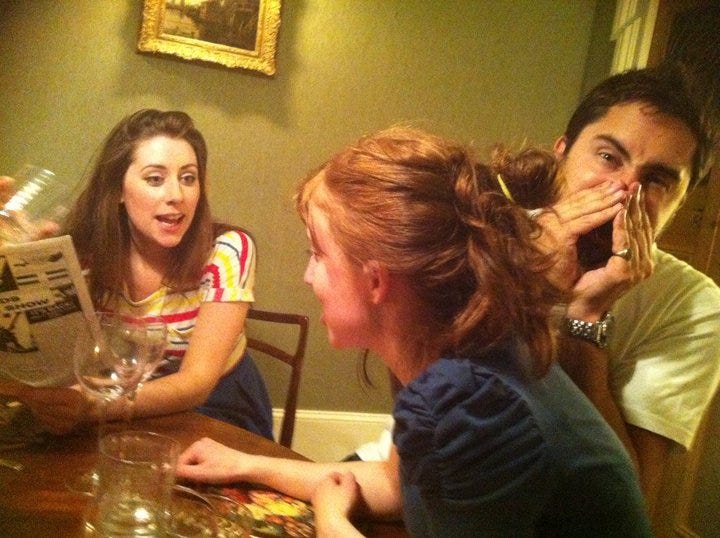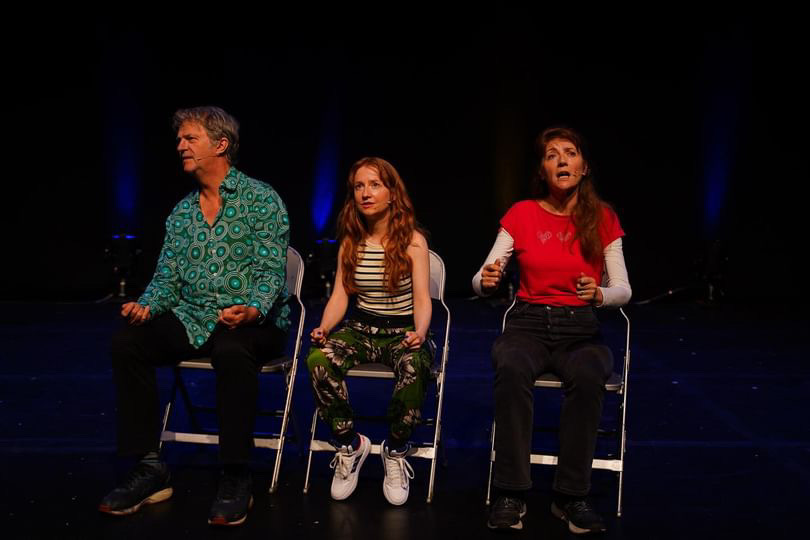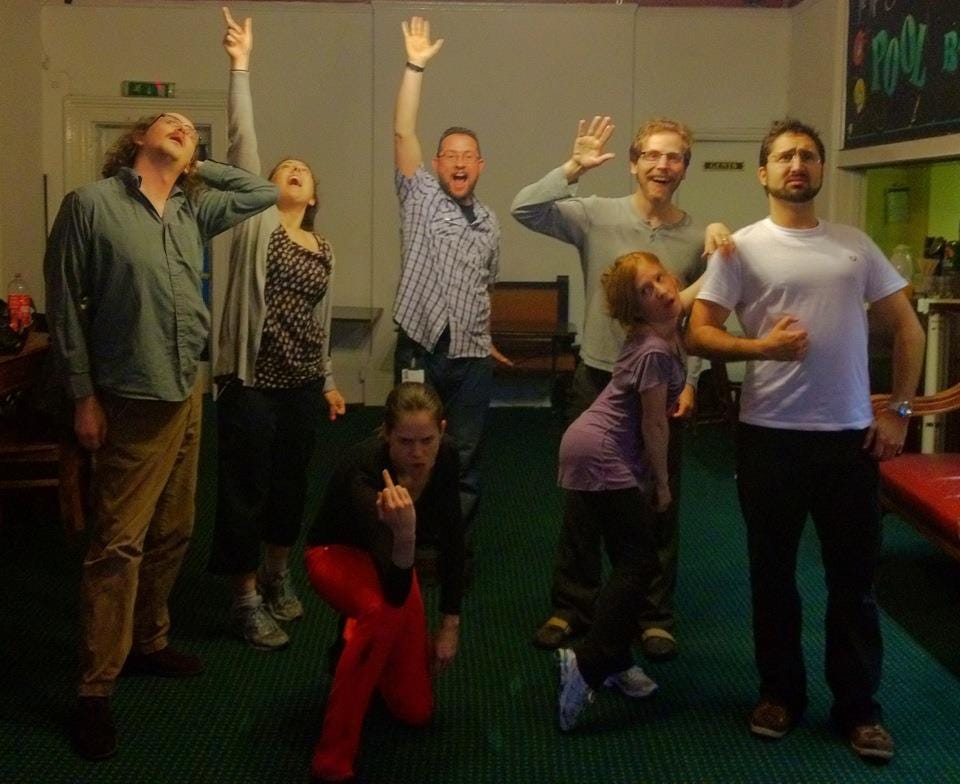My first improv group
Short-form, sunshine and good times
I came across two slightly dismissive articles recently, written by people who are not improvisers, describing uk short-form improv as “ad libbed games” and “competitive games.” These descriptions set my teeth on edge and made me want to leap to short-form’s defence. In the grand scheme of things it doesn’t matter, but I’ve decided that this is the hill I will die on, and I’m going to walk all the way to the imaginary top!
For those of you who are not improv nerds like me, short-form improv refers to stand alone improvised games, in which the rules/structure are spelt out beforehand, whereas in long-form improv, the game of the scene/themes or narrative are discovered as you go.
Full disclosure, I like ALL kinds of improv; long-form, short-form, musical, narrative, Chicago-style, Keith Johnstone style, organic, self raising and yes even lactose free.
Arguably if you are improvising at a high level you should be able to jump into any kind of improvised show. Musical improv is an exception, because it relies on additional skills outside of improv such as rhythm, singing, harmonising, movement, dancing and musicality. On the whole though, most improv is just making stuff up on the spot. It involves initiating, listening, responding, relinquishing control, being in the moment, and being playful.
Part of the reason why I felt annoyed to see short-form written about so dismissively is because I have fond memories attached to it. I did my first short-form gig when I was new to improv, and I look back on that chapter of my life as a happy period, full of random gigs, cheap rent, and light-hearted friendships. The world of improv that I entered felt like the place I’d always been, while at the same time being a new discovery, and one which had a lasting impact on my life.
I initially encountered improvisation some time before this, whilst at drama school in Scotland. The ten weeks that I spent improvising in acting class there, were my favourite part of the three year course. What I didn’t know then, was that there was an ecosystem of improvisation all over the country, and indeed the world.
After graduating from drama school, while living in London, I learnt about Monkeytoast, an improv company which was set up and run by Canadian improviser David Shore. It was here that I learnt to improvise. We’d gather in a room in a synagogue every week, a medley of people, most of whom were not actors and who were there for a variety of reasons. Some had done improv before, one guy was there because he was an adrenalin junky, another worked in TV production. The class became an exciting part of my week, and the end of term show sealed the deal. I really enjoyed David’s classes, and clicked with the Chicago style long-form that was taught. I loved the rhythm of the collective comedy that would emerge on stage. There was nothing more satisfying than someone coming in with a really good button (punchline) and someone else ending the scene with a sweep*. Bliss!
*A sweep is a way of ending the scene by running across the scene.
It was in my Monkeytoast class that I met fellow improviser Andrew Gentilli, who invited me to do a short-form gig at a fringe festival in Stratford Upon Avon. His group The Inflatables, needed an extra person, so he asked if I’d sub in for them. I said yes, because, duh, I was doing improv classes so of course I was going to say yes, but at that point I’d never actually done short-form before. I kept this to myself and privately hoped that it would rely on the same set of skills as other types of improv. Thankfully, it did. I remember getting in the car with a bunch of improvisers I’d never met before and going to rehearse in Andrew’s parents house. When I look back, I feel so grateful to have been instantly accepted by those relaxed and funny performers. I can see us standing in the kitchen, the sun streaming through the windows, one of them casually filling me in on what games we’d be doing. A guitar in the living room, us breaking into song. The group were fun and kind. Following Andrew’s lead, they instantly trusted me, which in turn empowered me to do a good job on stage, because I wasn’t using up valuable headspace doubting myself.

That weekend I spent in Stratford Upon Avon doing short-form was one of the most generous experiences I’ve had in improv, which is why it was jarring to see it described in print as “competitive.” (Yes I’m still very much dying on this hill.) Believing that UK short-form is competitive is like believing that the points Dara Ó Briain use to dish out on British panel show Mock The Week meant anything. The “competitive” element is just a framing device for the audience. (Ok I’ve died on the hill now, resurrection follows. How topical.)
Not long after Stratford, Andrew, having been inspired by seeing American improv group PGraph, went on to form a new group called Storybag, which he invited me to join. This was to become my first proper improv group. Andrew skilfully hand picked improvisers who, when combined, made a really good ensemble. In some ways we were quite different from each other, but at our core I think we all shared the exact same type of playfulness. In addition we were all interested in telling stories, exploring relationships between the characters on stage, while at the same time being very at home with deeply silly and weird stuff. Even more crucially perhaps, everyone in the group was easy going, so there was never any competition or drama. I treasure the times we spent together, rehearsing regularly in Andrew’s flat, or now and again hiring a room in a pub to rehearse. We loved what we did. We put on our own improv night for a bit, we taught ourselves how to improvise a narrative, and we created an improvised show inspired by the writing of Haruki Murakami. Murakami was my favourite author and I felt that the magic realism of his books; featuring talking cats, enigmatic women and people sliding into other worlds, would suit improv in general, and our improv tendencies in particular.
Over time our lives changed; some members of the group moved out of London, some left the UK, others turned their focus to scripted comedy or to acting, some had kids. We let go lightly. In much the same way as we’d all found each other, when we moved away from each other there was no bad feeling, no resentment, no drama.
There’s something magical about doing a creative project just for pleasure, for the pursuit of the art-form, as opposed to doing it for a job. I understand why people want to try and professionalise their improv groups, but take it from me as someone who now does this (mostly) as a job, there’s a lot to be said for doing it for the sheer joy of making a show with people you click with. With low stakes and no pressure. If you have that now, with people whose sense of humour lights you up, then hold tight to it, and let go lightly when it’s time for you all to move on.
News
Susan Harrison: Should I still be doing this? Work in progress: solo show.
Wednesday April 23rd, Glitch, London 8.30pm.
Workshops: I’m teaching some improv workshops this Spring/Summer.
Scenes and feedback
Wednesday 28th May, London, 7.00pm-9.00pm
Acting for Improvisers (Day long workshop)
Saturday 5th July, London, 10.00am-5.00pm
Character for improv - all day intensive
Saturday 19th July, London 10.00am-5.00pm




Simply loved reading this. x
Sometimes in life, you meet people and the chemistry is unlike anything you've experienced before or since. I've had that with friendships that fizzled out: No argument, no bad feeling, just Old Father Time doing his wicked work. What a spoilsport he is.